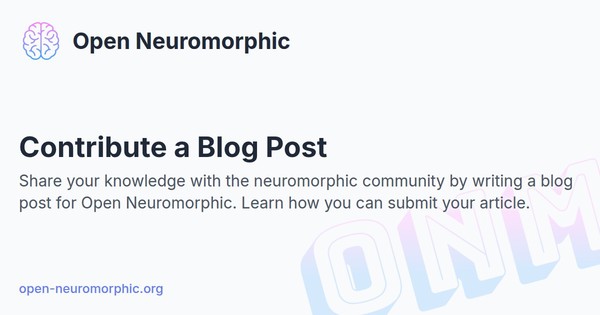Writing a blog post is one of the best ways to share your expertise, insights, or project updates with the global neuromorphic community. We welcome a variety of topics and are here to help you get your work published on our platform.
Why Write for ONM?
- Reach a Global Audience: Your work will be featured on our platform and promoted across our social channels, reaching thousands of researchers, students, and industry professionals.
- Build Your Profile: Establish yourself as a voice in the neuromorphic field.
- Educate and Inspire: Help others learn, solve problems, and get excited about the future of brain-inspired computing.
How to Submit Your Post
We offer two straightforward ways to submit your blog post. Choose the one that works best for you.
Method 1: The Simple Way (Recommended)
This is the easiest way to contribute. You write the content, and we’ll handle the rest.
- Write your post in a standard format like Markdown (
.md), a Google Doc, or a simple text file. - Gather your images and other assets in a folder.
- Send it to us!
- Discord: Send a message to Jens E. Pedersen, Justin Riddiough, or Danny Rosen on our Discord server, or post in the
#proposals-contributionschannel. - Email: Send your post and assets to contact@open-neuromorphic.org.
- Discord: Send a message to Jens E. Pedersen, Justin Riddiough, or Danny Rosen on our Discord server, or post in the
Method 2: The GitHub Way (Pull Request)
If you’re comfortable with Git and GitHub, you can follow our standard contribution process.
- Follow the guide in our CONTRIBUTING.md to create a new blog post using the archetype.
- Create a new branch for your post.
- Submit a Pull Request with your completed post. Our team will review it and merge it.
What We’re Looking For
We welcome a wide range of topics, including but not limited to:
- Tutorials on neuromorphic software or hardware.
- Summaries and analysis of recent research papers.
- Project updates or case studies.
- Opinion pieces on the future of the field.
- Deep dives into specific neuromorphic concepts.
If you have an idea, don’t hesitate to pitch it to us first on Discord!
